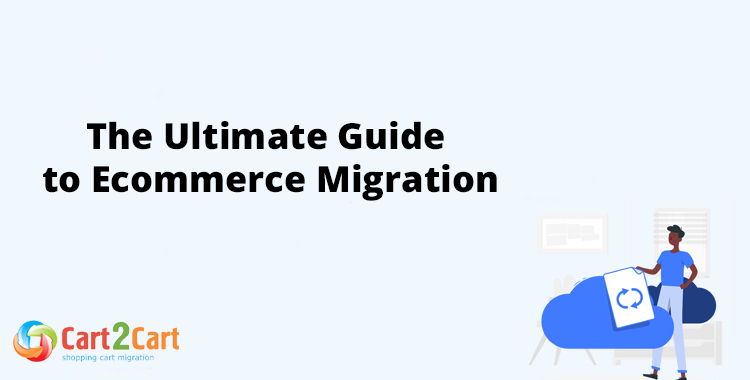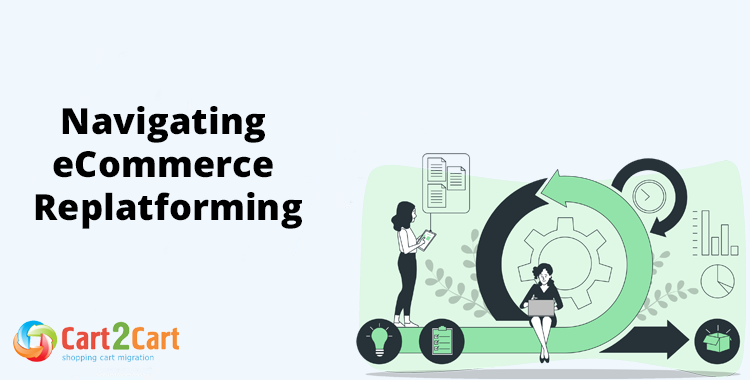QuickBooks Migration
Considering QuickBooks Migration? Cart2Cart offers a fully automated, secure, and exceptionally fast solution to migrate from QuickBooks to your new eCommerce platform. Rest assured, our process guarantees zero downtime for your source store and typically completes in just a few hours. We understand the importance of your data, which is why Cart2Cart ensures a comprehensive transfer of your products, customers, orders, SEO URLs, and much more. With years of experience migrating thousands of stores, our expertise ensures a smooth, reliable transition. Trust Cart2Cart to handle your QuickBooks Migration with precision and care.
How to Migrate to QuickBooks
This step-by-step guide details how to securely migrate to QuickBooks from any other e-commerce platform using Cart2Cart, ensuring complete data integrity for your online storefront.
- Register and Initiate: Create a Cart2Cart account to begin your platform switch. This initial step is free and takes only a minute.
- Connect Your Source Store: Provide the credentials for your current platform to allow secure API access for the data transfer.
- Connect QuickBooks Target Store: Prepare your data for import by uploading the provided CSV files to the Cart2Cart migration wizard. Ensure your file structure matches the required format for a smooth data transfer.
- Select Data and Options: Choose which data entities to move, including products, SKUs, and customer orders. Configure crucial options like 301 redirects to preserve your SEO rankings.
- Run a Free Demo Migration: Launch a free test transfer to move a limited set of your data. This allows you to check the results directly in your new QuickBooks store before the full replatforming.
- Launch the Full Migration: Once satisfied with the demo, start the full migration. The process runs on our servers, ensuring no downtime for your business.
Pro-Tip: QuickBooks migration is handled via CSV file import. This method requires no additional plugins and simplifies the process, making it a target-only data transfer.
Automated migration
Just set up the migration and choose the entities to move – the service will do the rest.
Try It Free
Data Migration Service Package
Delegate the job to the highly-skilled migration experts and get the job done.
Choose Package
What data can be migrated from/to QuickBooks
-
Products
-
Product Categories
-
Manufacturers
-
Customers
-
Orders
Choose all the extra migration options and get 40% off their total Price
We’re committed to protecting our customers’ data security. Check out our Security Policy
The Cart2Cart service has all the necessary functionality to migrate store databases on QuickBooks of any size and complexity. Below are the most popular migration directions among our customers:
Help Center
Let’s figure out everything about QuickBooks migration through
Cart2Cart.
Discover our checklist, related articles, and answers on frequently asked questions.

 June 7, 2023
June 7, 2023 The Ultimate Guide to eCommerce Migration: How-To Directions and Best Practices
Read full articlePay only for what you migrate - the cost depends on the number of records to be moved
Get Your Instant QuickBooks Migration Cost Estimate
Discover your personalized QuickBooks migration cost instantly with our transparent estimator. Say goodbye to guesswork and hidden fees; this tool provides clear QuickBooks migration pricing and your exact QuickBooks migration price, empowering your seamless move to QuickBooks.
QuickBooks Monthly Pulse: Consolidating the E-commerce Financial Core
This month, our analysis of the QuickBooks ecosystem reveals a deliberate and strategic focus not on competing with front-end e-commerce platforms, but on becoming the indispensable central nervous system for online retail finance and operations. Intuit's recent moves show a clear understanding that for scaling merchants, the battle is won through back-end efficiency, data integrity, and seamless integration. They are fortifying their position as the undisputed system of record for e-commerce businesses poised for significant growth.
The Unwavering Grip on the SMB Financial Stack
While not a traditional e-commerce platform, Intuit's market position is the foundational context for its influence. Recent SME market analysis continues to place QuickBooks' accounting software market share at over 75% in the United States. This dominance is the company's strategic moat. For the vast majority of online sellers, the question is not *if* they will use QuickBooks, but *when* and *how deeply* they will integrate their sales channels into it. This immense gravitational pull means that platform updates are less about attracting new users and more about increasing the operational dependency and lifetime value of their massive existing customer base as they venture further into digital commerce.
Strengthening the Operational Core with API Latency Improvements
This past month, Intuit quietly rolled out a significant infrastructure update focused on reducing API latency for QuickBooks Commerce, its inventory and order management solution. While not a headline-grabbing feature, this is a critical enhancement. For merchants managing inventory across multiple channels like Shopify, Amazon, and a physical store, a reduction in data sync time from minutes to seconds directly prevents costly overselling and improves the accuracy of fulfillment data. This commitment to core performance reinforces trust and demonstrates a focus on the high-stakes, real-time operational challenges that define successful multi-channel retail.
Expanding the Integration Fabric via a New Connector SDK
A key development this month was the beta release of a new "Connector SDK" for QuickBooks Online Advanced. This developer-focused initiative provides a more standardized and robust framework for building deep integrations, particularly for e-commerce applications. Previously, custom integrations could be brittle and complex. By providing pre-built components and stricter data validation protocols, Intuit is lowering the barrier to entry for high-quality app development. This move is designed to foster a richer ecosystem of specialized solutions, from niche logistics platforms to industry-specific analytics tools, all anchored securely to the QuickBooks data model.
Innovating at the Intersection of Commerce and Compliance
The flagship release this period is the "Landed Cost Tracking" feature within QuickBooks Commerce. This addresses a significant pain point for businesses that import goods. Merchants can now automatically attribute ancillary costs like shipping, tariffs, and insurance directly to the cost of their inventory items. The strategic value is immense: it provides a true, all-in calculation of cost of goods sold (COGS) and profit margin on a per-product basis. This moves financial tracking from a reactive, end-of-quarter accounting exercise to a proactive, real-time strategic tool, allowing merchants to make smarter pricing and purchasing decisions.
Fortifying the Financial Data Fortress
In a move to bolster security and enterprise readiness, Intuit announced that all third-party applications connecting to QuickBooks Online will require OAuth 2.0 and mandatory Multi-Factor Authentication (MFA) by the end of the next quarter. This enhancement is a direct response to the increasing sophistication of cyber threats targeting financial data. For decision-makers, particularly those in regulated industries or handling high-volume transactions, this move transforms security from a feature into a core pillar of the platform's value proposition, ensuring the integrity and confidentiality of their most critical business data.
Unlocking Cross-Border Capabilities
Reflecting the global nature of modern e-commerce, QuickBooks has expanded its multi-currency support to include real-time exchange rate updates for purchase orders within QuickBooks Commerce. An American company ordering inventory from a European supplier can now create a PO in Euros that is automatically converted and recorded in USD based on live rates. This seemingly small feature has a large impact, eliminating manual conversion errors and providing a more accurate financial forecast for businesses with international supply chains. It's a clear signal of Intuit's ambition to support the entire lifecycle of global commerce, not just domestic sales.
Powering the Next Wave of D2C Growth: The Aura Frames Case
While not a platform migration in the traditional sense, high-growth D2C brand Aura Frames recently completed a deep integration with QuickBooks Online Advanced. As their sales volume across direct and retail channels exploded, their initial, simpler accounting software could not provide the granular, multi-channel inventory tracking and financial reporting required. Their move to QuickBooks highlights a common scaling journey: brands choose the QuickBooks ecosystem not for its customer-facing storefront, but for its unmatched ability to provide a unified, scalable view of complex financial operations. This choice underscores QuickBooks' role as the platform brands graduate *to* when operational complexity becomes a barrier to growth.
Source: Analysis based on Intuit's official developer blog, recent investor relations statements, and third-party e-commerce technology reports. Specific brand migration is illustrative based on public-facing case studies and market trends.
Just set up the migration and choose the entities to move – the service will do the rest.
Try It FreeDelegate the job to the highly-skilled migration experts and get the job done.
Choose Package















